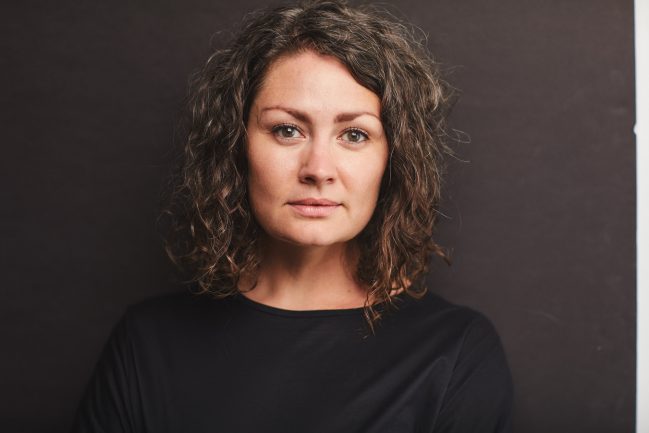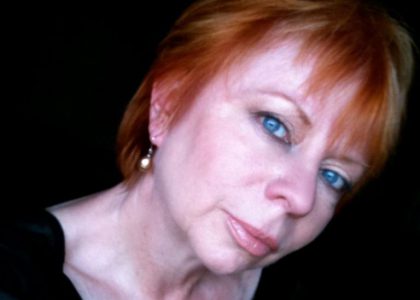Tellwell’s managing editor Alison Strumberger on why she believes editing is crucial for a quality book
There is an unwritten contract between an author and their readers. Picking out a book, purchasing and opening that book, sitting down in a solitary moment to read that book – all of this is an act of trust. It’s a leap of faith. It’s an investment of your readers’ time, money, and attention.
Alison Strumberger, Tellwell’s Managing Editor
Tell us about your background, as well as your role at Tellwell.
I’ve been working in publishing for a little over fifteen years, starting out as a submissions reader for a magazine in Montreal while completing a BA in English literature and creative writing. I went abroad after I graduated. Thirty countries and some years later, my travels took me to Melbourne, Australia, where I got my MA in publishing and editing while working in both trade and educational publishing houses. I ran my own writing/editing business for several years, editing everything from novels and travel guides to celebrity memoirs and annual reports. My own essays, fiction and poetry have appeared in numerous magazines and journals in Canada and Australia.
Here at Tellwell I mostly manage the editing department, and have been doing so since I moved to Victoria and joined the Tellwell team in 2017. In my capacity as managing editor, I make sure to recruit (and rigorously test!) highly experienced and professional editors who love what they do, and who are as passionate as I am about supporting authors to make their good writing great. It’s an incredible privilege getting to work so closely with a cohort of twenty-five talented editors based across Canada, the US, the UK and New Zealand. Along with our indispensable in-house editor, Simon Ogden, I work closely to monitor the quality of the editing while adjusting our services to respond to feedback from our authors. I’m an inveterate perfectionist with high standards, so I keep the team on their toes! I also spend a lot of time focusing on the quality of our production process, working to improve what we make, and the experience of the amazing authors with whom we make it.
Why is editing crucial for creating a quality, professional book?
There is an unwritten contract between an author and their readers. Picking out a book, purchasing and opening that book, sitting down in a solitary moment to read that book – all of this is an act of trust. It’s a leap of faith. It’s an investment of your readers’ time, money, and attention. With each typo, error, malapropism, unintentional pun, break in logic, inconsistency, accidental repetition, missed punchline, unchecked fact, misused semicolon etc, that trust erodes, and so does the author’s credibility and the reader’s lasting impression.
A well-regarded book is not weighed down by its technical pitfalls, which can be plentiful and distracting in unedited books. It is disappointing to read a review of your book that says, “It would have been great, if only it had been edited.” The crux of your book – the concept, the idea, the dare-I-say genius of it – can be clouded or confused or missed altogether when the reader needs to wade through a sea of errors, correcting as they go.
Just as each word you put on a page contributes to the meaning of your work, so too does each space, each paragraph break, each punctuation mark. Your editor is an expert in units of meaning. As Mark Twain put it: “The difference between the almost right word and the right word is really a large matter; ’tis the difference between the lightning bug and the lightning.” Dr. Seuss put it more playfully perhaps: “The writer who breeds more words than he needs, is making a chore for the reader who reads.”
Your editor doesn’t see mistakes, they see opportunities to make your writing tighter, cleaner, and clearer.
Alison Strumberger, Tellwell’s Managing Editor
What do you consider to be a great edit?
A great edit improves the quality of a manuscript. It works with the existing voice and style to help the author say what they mean as clearly and elegantly as possible. Above all else, it leaves no trace of itself behind: a well-edited book should not seem edited; rather, it should read as though it’s what the author wrote in the first place.
A few years ago, a Tellwell author described his editing process as a masterclass. It was the first time I’d heard editing described this way, and to me it summed up the ideal experience: a great editor takes you under their wing; they encourage you and champion your cause; they draw on years of education, experience, and expertise; they challenge you to see your work differently; they teach you to be a better writer.
What is one of the challenges authors may face during the editing process?
I feel like a common challenge our authors face is the fear of being judged or misunderstood. For many Tellwell authors, their editor is the first person to read their book, or the first stranger to read it. Writing for most is an intensely private process. We do it in solitude, incrementally, over a period of months or years. We do it to the best of our ability. We check our work exhaustively, dither over commas, look up semicolon usage for the millionth time, and when it’s as good as we can get it, we submit it. Suddenly someone we’ve never met is reading it closely and we feel exhilarated and exposed. They’re deleting commas! They’re moving semicolons! They’re asking questions that we desperately want to answer!
Instead of letting authors continue to feel anxious about it, I encourage them to relax and open up to the process and the feedback. If the editor leaves a query in the margins it is likely a question your readers will have, so resist the urge to answer your editor; simply revise so your reader won’t have that same question and move on. Your editor doesn’t see mistakes, they see opportunities to make your writing tighter, cleaner, and clearer. In the end, it all comes down to you anyway; you can take the editor’s advice or leave it.
What advice do you have for authors considering having their work edited?
My advice is don’t skip it, for the reasons above as well as those below. Once you’ve decided to take the plunge, do your due diligence to ensure the best possible outcomes for you, your book, your future readers, and your editor.
The best ways to do this are:
- Polish your manuscript as much as you can. Editing can be expensive, so to get the most out of your money, your document should be at its best when the editor gets to work.
- Make sure to find an editor with a professional background and proven track record.
- Don’t rush! If you’re in a hurry, you’ll either end up frustrated by the process, or you’ll end up with an imperfect result, or both. Yes, you’ve just spent forever writing a book – a massive accomplishment – but in some ways, typing “The End” is only the first step.
- Consider that every author works with an editor – even the best of the best, even those with publishing contracts, even those working on their tenth book.
What advice do you have for authors who are going through the editing process?
Trust the process. When you open yourself up to editing as an experience and the unique author–editor relationship, wonderful things can happen. Ego dissolves, and the two of you are left working tirelessly for the good of the pages, and the good of the reader. As the inimitable writer and professor George Saunders puts it: “Sometimes when I’m working with an editor… there’s a feeling that both of you have receded and the story has come up… almost like you’re two doctors working on a patient: you don’t really care who made the incision, you want the thing to live.”
What do you love most about the editing process?
Helping authors really say what they mean while ironing out the technical wrinkles. It’s a bit like excavation: there are endless discoveries to make, large and small. Finding what was hidden, the thing that was crouching below the surface just waiting to emerge, is incredibly satisfying and rewarding for both the editor and the author.
What drew you to become an editor?
As a kid, I never spelled a word wrong on a spelling test. (Well actually, it happened once, and since that mortifying moment as a quiet and perfectionistic ten-year-old I’ve never once forgotten the second L in pollution.) Really though, it’s because of my passion for words. Language is so multifaceted, but in day-to-day life, we forget that – it becomes merely a tool, utilitarian, mundane. When treated properly, when chosen correctly, its potential to surprise and delight is boundless. So too is its potential to challenge. In a first-year creative writing class, I first discovered Emily Dickenson and her love poem, “Least rivers – docile to some sea” (1861). The brevity and perfection of this piece, the weight and meaning of each word, to me has always summed up the power and magic and delightfully confounding nature of language:
Least rivers – docile to some sea.
My Caspian – thee.
This poem is a little puzzle. Editing, too, is like solving a puzzle: turning the pieces around, arranging them and sliding them together, making things fit. Everything in a piece of writing should need to be there, and part of the fun is identifying the extra and bidding it farewell.
What are you most proud of? Biggest accomplishments?
My children. They’re one and three and the best things I’ve ever made. I also published my first book a few years ago, Redrafting Winter (BuschekBooks), which was a finalist for the QWF A.M. Klein prize for poetry. Any time I see my writing in print, actually, I have to stop and pinch myself.
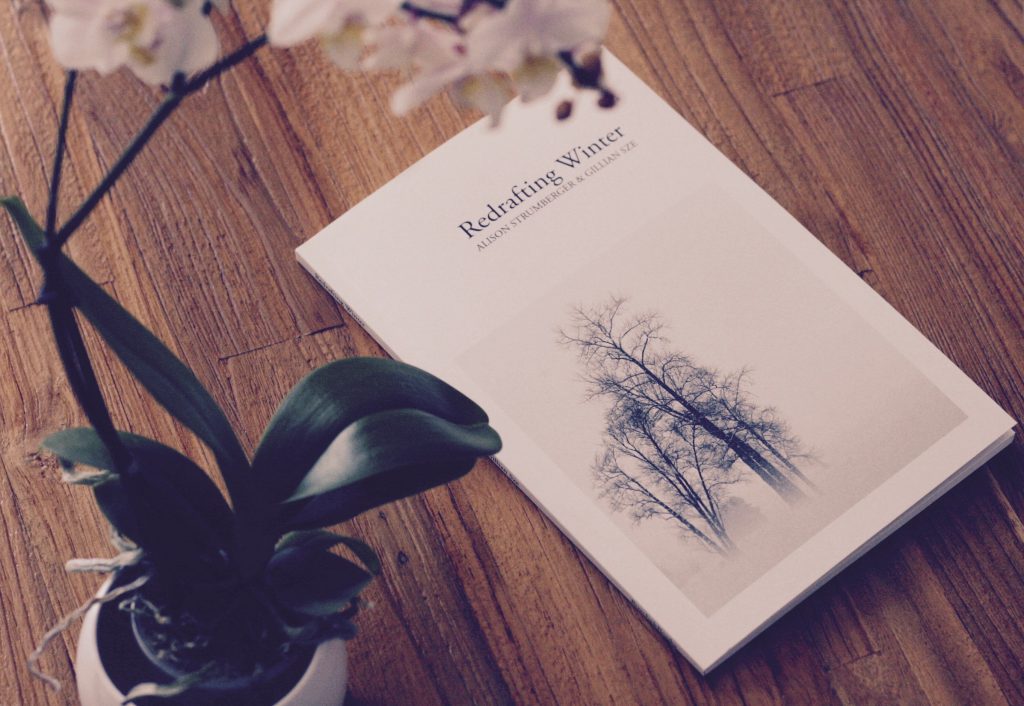
Redrafting Winter (BuschekBooks) by Alison Strumberger & Gillian Sze 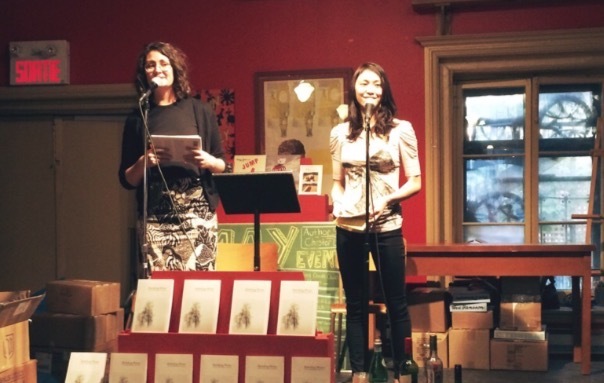
Launching Redrafting Winter at Librairie Drawn & Quarterly in Montreal
What are your favourite books to read? Any recommendations?
Before all my time was spent picking up chewed (read: partially eaten) board books and tripping over Bluey figurines, I always had a novel or story collection, a book of poetry, and a piece of nonfiction (generally cultural criticism or philosophy) on the go. This trifecta made me feel like I was constantly bettering my heart, and my writing, and my powers of critical thought. A few of my top writers for each of the above:
- Poetry: Mary Ruefle, Gillian Sze
- Short fiction: Lori Moore, George Saunders
- Longform fiction: Ali Smith, Kurt Vonnegut
- Cultural criticism/essayists: Annie Dillard, Rebecca Solnit
- Philosophy: Slavoj Zizek, Susan Sontag
These days I read primarily children’s books, for obvious reasons. There are many, many good ones. My current favourite is Darling Baby by Miara Kalman: simple, beautiful, emotive, and slightly odd.
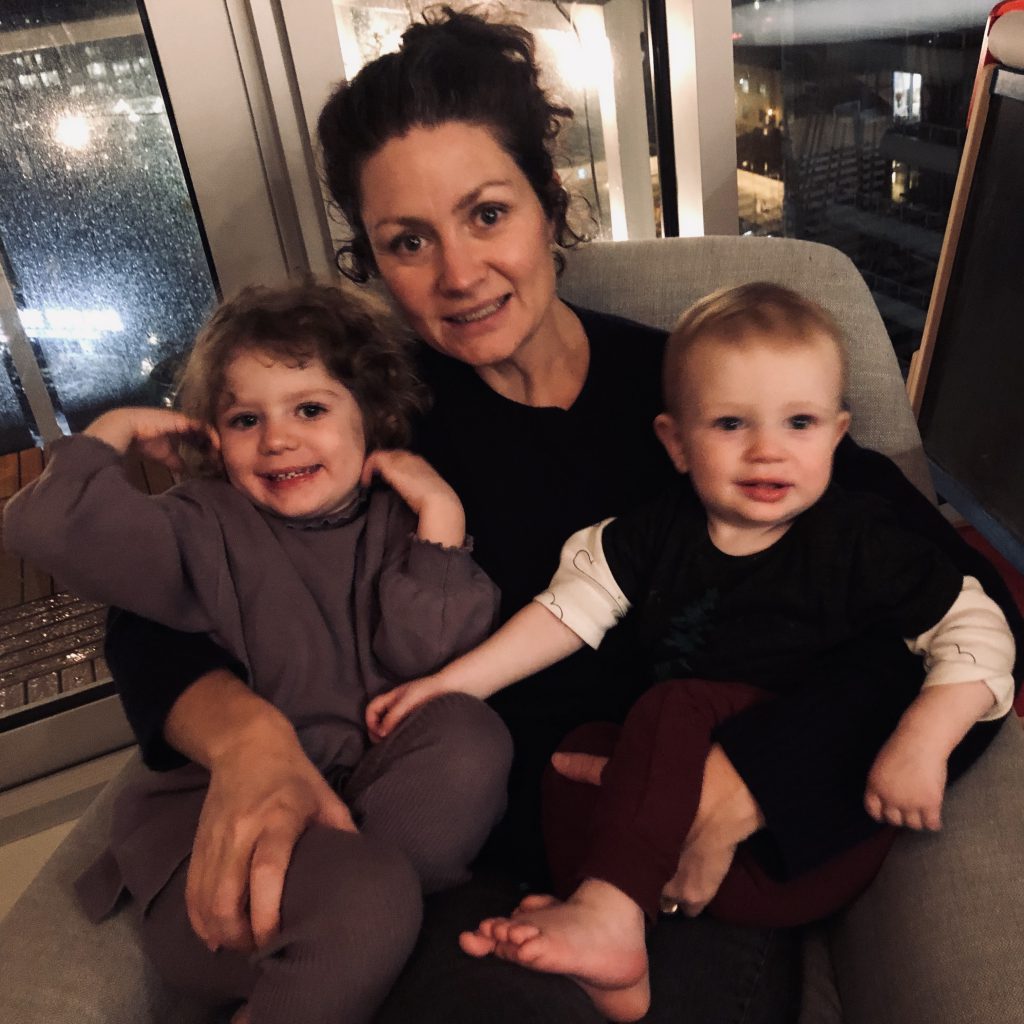
What do you enjoy doing outside of work?
I like playing with the kids (“cat family” is a favourite of theirs these days, which sees my husband and I spending protracted periods on all fours, obeying commands) and watching them experience elements of the world for the first time. Seeing the determination in your child as they gradually come to grips with their environment (the first time they pass an object from one hand to another; the first time they successfully stack a block upon another; the look of amazement in their faces when they first discover the Earth is in constant rotation) is breathtaking. Parenting is a remarkable experience of rediscovering the minute details in life, and the joy and satisfaction they often bring.
But besides marvelling over the miracle of life, I like to cook, read, write, play guitar, and take exceptionally long walks.
Take a look at Tellwell’s editing services.
